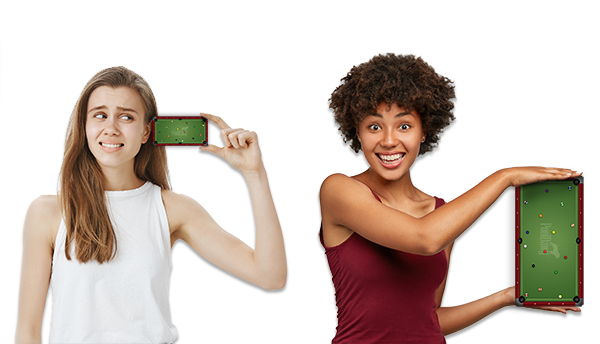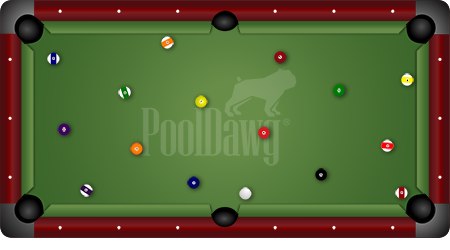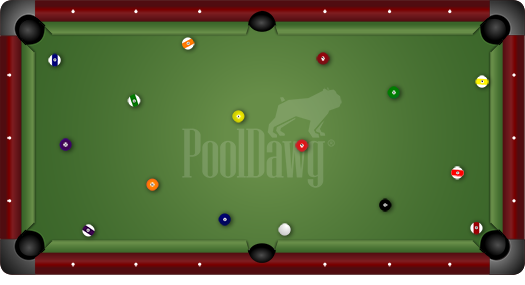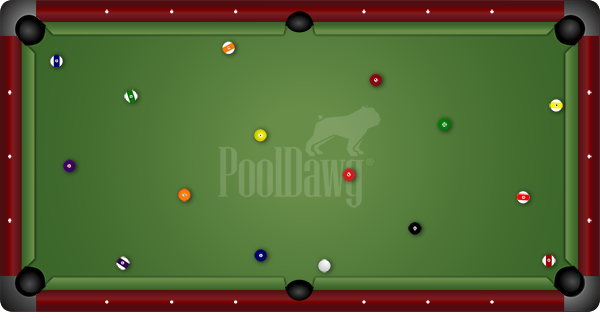
One of the most interesting things about pool, infuriating to some, is that there's no one standard size of table. For every person who turns their nose up at a 7-foot bar box for being a toy, there's another who fears and avoids the extended green of a 9-footer. To each their own, but there are different aspects and strategies to consider depending on the size of the table. Learning to adapt your skills to a variety of formats pays dividends; don't pass up the opportunity to hone your skills just because "you don't play on THAT size table."
7-Foot Pool Tables (7ft x 3.5ft)

Conditions on a bar table can range from matted felt, dead rails and gaping jaws for pockets, to very fast cloth, lively rails and tough pockets that make the set-up resemble a miniture pro table. Keep an eye out for the type of cue ball in play – if it's larger or heavier than the other balls, you'll need to aim lower and shoot harder to get the expected effect.
8-ball on a bar table can be like having a head cold – constant congestion. Instead of viewing this as an inherent evil, learn to embrace the creativity needed to be successful. One rule of thumb is to minimize cue ball movement to keep yourself from getting snookered, even if it means taking a longer shot, a bank, combo or a carom – these speciality shots are much easier at the shorter distances a bar table provides. Congestion is conducive to very effective safety play, bide your time before attempting a run-out to let your opponent get some of his balls out of the way so that you have more room to maneuver.
9-ball on a bar table is even more fast-paced than on a larger table. It pays to be very aggressive because shot making is much easier. Since the pockets take up a larger ratio of space, slopping balls in happens at an alarming rate. Unfortunately, the cue ball is more likely to go in as well, so you'll need to learn to control your angles and speed very precisely.
8-Foot Pool Tables (8ft x 4ft)

Halfway in between a bar table and a full-sized table, 8-footers can resemble either end of the spectrum. In general, they will have forgiving pockets like a 7-footer, but the extra distance will require a similar intensity of focus to a 9-foot table for pocketing and position.
Both 8-ball and 9-ball can be very satisfying on an 8-foot table. It's truly the best of both worlds. With more room to play position and pocketing that remains relatively easy, you'll have more run-outs on this size of table than any other. Your opponent will also be enjoying this opportunity, so it's an excellent chance to sharpen your defense, as well.
 Frank Says: "When playing on a pro-sized pool table it is extremely helpful to have a professional caliber low deflection pool cue. "
Frank Says: "When playing on a pro-sized pool table it is extremely helpful to have a professional caliber low deflection pool cue. "
9-Foot Pool Tables (9ft x 4.5ft)

The challenges of 8-ball change on a table of this size. Playing out one area of the table before moving on to another minimizes errors due to long-range shots and poor positioning. Things can go very smoothly if all your balls are free and clear, but breaking up clusters becomes more difficult when they are far away from everything else. Often you'll need to lag one or more of your suited balls closer to a cluster just to have a good chance to break it apart.
9-ball on a 9-foot table is rigorously athletic – you'll regularly have to execute difficult shot-making and precise positioning to play at a high level. It also calls upon every speed of stroke, from a crushing breaks to the softest safety. Learning to leave yourself close to the object ball with the proper angle to travel around the table is the meat and bones of playing this game well and can take years to fall into place.
Though the 9-footer is the pro-sized table, professional players regularly tear it up on tables of all sizes in tournaments and private games. They know that pool is pool – there are no small tables, only small players.
- RELATED ARTICLES
- How Much Space Do I Need For my Pool Table? – By PoolDawg Staff
- Pool Etiquette: 5 Ways to Avoid Being "That Guy" – By Mikey V
- Pool Table Evaluation Checklist – By Tom Simpson